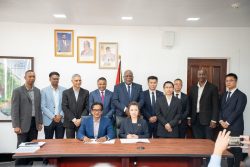 Last week’s column # 80 described Guyana’s Third Draft Local Content as junk and recommended that it be scrapped. It indicated too that this week’s column will identify some of the main ingredients recognised by similarly placed policy-makers from developing countries as critical to local content. The term itself is neither new nor difficult having been first introduced in the North Sea in the early 1970’s when that region became the new oil frontier. As a matter of definition, the general meaning is the share of employment or of sales to the sector locally supplied at every stage in the process or value chain.
Last week’s column # 80 described Guyana’s Third Draft Local Content as junk and recommended that it be scrapped. It indicated too that this week’s column will identify some of the main ingredients recognised by similarly placed policy-makers from developing countries as critical to local content. The term itself is neither new nor difficult having been first introduced in the North Sea in the early 1970’s when that region became the new oil frontier. As a matter of definition, the general meaning is the share of employment or of sales to the sector locally supplied at every stage in the process or value chain.
It is important to note that the concept is not peculiar to the petroleum sector and can apply to any operation in in any economy for which goods and services can have competing domestic and international suppliers. Indeed, it is not even new to Guyana as the Mineral Agreement signed with Cambior of Canada for the Omai Gold Mines Limited project in Guyana eloquently attests. That Agreement imposed restrictive quotas for foreign labour and broader restrictions on domestic procurement of goods. And in the petroleum sector itself, the 1986 Petroleum Exploration and Production Act and Regulations explicitly requires applications for prospecting and production licences to contain proposals satisfactory to the Minister. Our dear Mr. Trotman however, took it upon himself with the blessing of Cabinet to waive those requirements, clearly acting against our national interest and in violation of the law.
What makes Trotman’s failure more egregious and damaging is that the design of local content policies is not solely or principally guided by technical or economic considerations or expertise and experience and the need to address the weaknesses of the market, but as the World Bank has noted in its leading publication on Local Content Policy, “political imperatives are key drivers, and economic efficiency is often an afterthought.” In other words, the national economy and the domestic society stand to gain even if the local content policy may prefer a local supplier charging more than the foreign supplier for the same service or product. In Guyana’s case, we receive the worst of both worlds – no local content and higher foreign costs.
That is the price of the incompetent management of the petroleum sector over four years but with consequences for the next forty years. This is no exaggeration as prospecting licences last for ten years and production licences for thirty years during which Guyana can make no laws or propose no changes to the Esso/Hess/CNOOC Agreement adverse to these companies without their agreement or compensation. Such devastating and catastrophic incompetence has never been seen in Guyana but sadly, it is likely not to be the last.
Yet, in one sense, the failure by Granger & Co is perfectly understandable. Again, as the World Bank notes, LCP’s are part of the broader category of policy interventions aimed at strengthening the productive structure of the economy.
The success of any LCP, according to the World Bank, largely depends on their interaction and coherence with broader economic development policies and related implementation tools. Any Administration whose sole economic policy is the label The Good Life has failed to grasp some of its very basic functions and duties and is therefore incapable of managing an economy experiencing a serendipitous transformation as Guyana is about to. An example of this is that even before First Oil, this Government has squandered a not insignificant portion of the US$20 million World Bank loan taken by Guyana to make itself ready for the first pour. As hurtful as it might seem, one now has to wonder whether, in the context of the imperative for and the design of an LCP, Dr. Mark Bynoe is any improvement on the disastrous Raphael Trotman and whether it may just be that the failure goes to the highest level of this Administration.
Afterall, certain things have to precede the design of a local content policy which has to be country-specific having regard to a host of factors including the availability of local resources and how quickly and by what means they should be developed and at whose expense. The first thing therefore is to consider the type of preferred policy ranging from any: Indifference; Encouraging; Assertive; and Prescriptive. Indifference refers to the style adopted to date: not only do operators do as they please but every Tom, Dick and Betty can come and set up shop here and be considered local. Paradoxically, the Government has acted with total disregard for local content preferring to go abroad for any of its own needs.
An encouraging local content policy is one where the State seeks to persuade but neither rewards, enforces nor penalises for compliance or non-compliance. The third and final type recognized by the World Bank is the assertive type of policy in which there are quantitative targets for local content and the establishment of LCP statements and supporting legal and regulatory frameworks. I consider that there is a fourth and that is the prescriptive in which the entire architecture supports local content with clearly specified laws, rules, quotas, exclusions, incentives and penalties. This concept is not new as any person familiar with the 2004 Investment Act of 2004 will testify.
My preference is for the fourth type which I am sure will raise some eyebrows given our local capacity. We forget that Guyanese means more than resident and I am sure that an inventory of Guyanese with skills and experience in the petroleum sector will reveal that the skills are available with the right policies in place. We must bear in mind too that there was no need to have first oil without some training and education in respect of labour and some Registry of Needs to inform the public and the private sector of the opportunities associated with petroleum production. It is now four- and one-half years since the initial announcement of oil discovery but the Government has taken very little effective action to ensure nationals benefit from the first phase of oil production which will probably run to 2022.
The World Bank has noted that countries with significant petroleum resources tend to adopt more assertive policies which is the most stringent according to their classification. My classification goes even further and follows for example countries like Kazakhstan, Angola and even Trinidad and Tobago whose “LCP is predicated on maximising citizens’ ownership, control, and financing of all activities along the energy resources sector, both locally and internationally.”
Column # 82 will begin with a definition of local in the context of local content. I like the Trinidad approach which seems most appropriate for Guyana.









